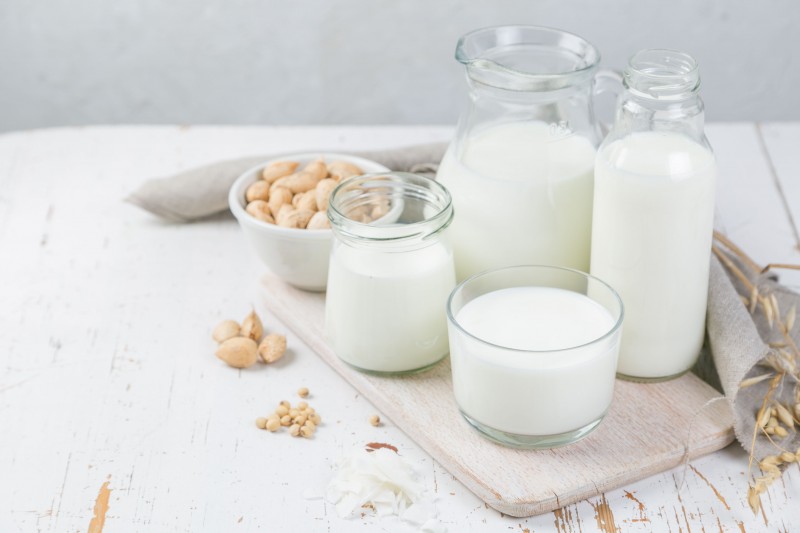
In today's health-conscious world, many individuals are seeking alternatives to traditional cow's milk. Whether it's due to lactose intolerance, dietary preferences, or ethical reasons, there's a growing demand for healthier milk options. We've reached out to nutritionists and health experts to shed light on the best milk alternatives available.
Almond milk is a popular choice known for its light, nutty flavor. According to Dr. Sarah Turner, a nutritionist, "Almond milk is low in calories, making it a great choice for those watching their weight. It's also naturally lactose-free and provides essential nutrients like vitamin E."
Soy milk, derived from soybeans, is rich in protein and often fortified with vitamins and minerals. Nutritionist Lisa Johnson emphasizes its benefits, stating, "Soy milk is an excellent source of plant-based protein, making it an ideal choice for vegans and vegetarians."
Oat milk has gained popularity for its creamy texture and heart-healthy properties. Dr. Michael Adams, a cardiologist, explains, "Oat milk is naturally cholesterol-free and contains beta-glucans, which can help lower cholesterol levels."
Coconut milk adds a tropical flavor to your beverages and dishes. Dr. Emma Roberts, a dietitian, notes, "Coconut milk is rich in medium-chain triglycerides (MCTs), which are easily digestible and may support weight management."
Cashew milk is a creamy and versatile alternative. Nutritionist Alex Davis says, "Cashew milk is a good source of healthy fats and can be used in both sweet and savory recipes, making it a versatile option."
Rice milk is a mild and allergen-free option for those with nut or soy allergies. Dr. Laura Wilson, an allergist, explains, "Rice milk is hypoallergenic, making it suitable for individuals with common food allergies."
Hemp milk is derived from hemp seeds and offers a unique nutrient profile. Nutritionist Mark Thompson highlights, "Hemp milk contains omega-3 fatty acids, which are beneficial for heart and brain health."
Flax milk is a plant-based milk known for its omega-3 fatty acid content. Dr. Rebecca Foster, a nutrition expert, says, "Flax milk is a great choice for those looking to boost their omega-3 intake, which can benefit cardiovascular health."
Macadamia milk is creamy and low in calories, making it an appealing option. Dietitian Sarah Mitchell notes, "Macadamia milk is a delicious choice for coffee lovers and those seeking a creamy texture without excessive calories."
Pea milk is a rising star among plant-based milks due to its high protein content and eco-friendly production. Nutritionist Chris Baker explains, "Pea milk is an eco-conscious choice, as peas require less water and land compared to some other crops."
Walnut milk is known for its brain-boosting properties. Dr. Rachel Carter, a neurologist, states, "Walnut milk is rich in antioxidants and omega-3 fatty acids, which may support cognitive function."
Hazelnut milk offers a delightful nutty flavor that enhances various recipes. Nutritionist Olivia Turner suggests, "Hazelnut milk adds a unique taste to coffee, oatmeal, and baked goods, making it a flavorful choice."
Pistachio milk is creamy and nutrient-dense, making it a wholesome choice. Dietitian Daniel Parker says, "Pistachio milk is a good source of protein, fiber, and healthy fats, contributing to satiety and overall nutrition."
Quinoa milk is gluten-free and nutrient-rich, suitable for those with gluten sensitivities. Dr. Lisa Green, a gastroenterologist, explains, "Quinoa milk provides essential vitamins and minerals, making it a nutritious choice."
Sunflower seed milk is a light and allergen-friendly milk alternative. Nutritionist Jessica Lee highlights, "Sunflower seed milk is free from common allergens, making it a safe choice for those with allergies."
Potato milk is a unique and creamy option gaining popularity. Dietitian Emily Scott says, "Potato milk offers a creamy texture and a mild flavor, making it a versatile addition to various dishes."
Pecan milk boasts a rich and nutty flavor profile. Dr. Jason Evans, a flavor scientist, notes, "Pecan milk's distinct flavor can enhance both sweet and savory dishes, appealing to those looking for a unique taste."
Walnut milk is creamy and nutrient-dense, making it a wholesome choice. Dietitian Daniel Parker says, "Walnut milk is a good source of protein, fiber, and healthy fats, contributing to satiety and overall nutrition."
Quinoa milk is gluten-free and nutrient-rich, suitable for those with gluten sensitivities. Dr. Lisa Green, a gastroenterologist, explains, "Quinoa milk provides essential vitamins and minerals, making it a nutritious choice."
Sunflower seed milk is a light and allergen-friendly milk alternative. Nutritionist Jessica Lee highlights, "Sunflower seed milk is free from common allergens, making it a safe choice for those with allergies."
When it comes to choosing a healthy milk alternative, there are plenty of options to suit various dietary needs and preferences. Each alternative has its unique qualities, so it's essential to consider your nutritional goals and taste preferences when making your selection.
Is eating stale mouth beneficial or harmful? Learn from Health Expert
10 foods that are safe to eat if you have lactose intolerance